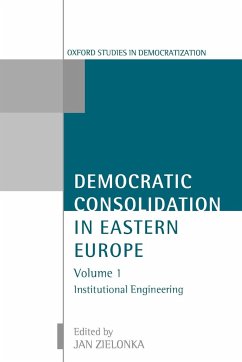
Democratic Consolidation in Turkey
State, Political Parties, Civil Society, Civil-Military Relations, Socio-Economic Development, Eu, Rise of Politic
Herausgeber: Aknur, Muge
Versandkostenfrei!
Versandfertig in 1-2 Wochen
44,99 €
inkl. MwSt.

PAYBACK Punkte
22 °P sammeln!
Although Turkey began its transition to democracy as early as the 1950s, it is still far from having reached a level of consolidated democracy with the country's sixty-year history of democratic politics being punctuated by numerous breakdowns and restorations of democracy. In an attempt to examine why consolidation of Turkish democracy has taken so long, this book aims at analyzing various factors including state, political parties, civil society, civil-military relations, socio-economic development, the EU as an international actor and the rise of internal threats (political Islam and separa...
Although Turkey began its transition to democracy as early as the 1950s, it is still far from having reached a level of consolidated democracy with the country's sixty-year history of democratic politics being punctuated by numerous breakdowns and restorations of democracy. In an attempt to examine why consolidation of Turkish democracy has taken so long, this book aims at analyzing various factors including state, political parties, civil society, civil-military relations, socio-economic development, the EU as an international actor and the rise of internal threats (political Islam and separatist Kurdish nationalism) that both hinder and enhance democratic consolidation in Turkey. By highlighting the strengths and shortcomings of the Turkish experience from these perspectives, this book suggests the optimal policy priorities for current and future Turkish governments to establish a consolidated democracy in Turkey. Contributors: Muge Aknur, Canan Aslan-Akman, Filiz Baskan, Gulgun Erdogan-Tosun, Siret Hursoy, Aysegul Komsuoglu, Gul M. Kurtoglu-Eskisar, Yesim Kustepeli, Nazif Mandaci, Ibrahim Saylan, & Ugur Burc Yildiz.












